-
 Bitcoin
Bitcoin $88,339.1961
0.91% -
 Ethereum
Ethereum $1,623.6446
-1.44% -
 Tether USDt
Tether USDt $1.0000
0.00% -
 XRP
XRP $2.0967
-1.79% -
 BNB
BNB $605.9401
0.19% -
 Solana
Solana $139.2951
-0.86% -
 USDC
USDC $0.9999
0.00% -
 Dogecoin
Dogecoin $0.1638
0.91% -
 TRON
TRON $0.2483
1.38% -
 Cardano
Cardano $0.6385
-1.29% -
 Chainlink
Chainlink $13.3308
-1.87% -
 Avalanche
Avalanche $20.1673
-2.64% -
 UNUS SED LEO
UNUS SED LEO $9.0629
-4.15% -
 Stellar
Stellar $0.2460
-5.31% -
 Sui
Sui $2.3030
1.33% -
 Shiba Inu
Shiba Inu $0.0...01249
-1.52% -
 Toncoin
Toncoin $2.9244
-3.95% -
 Hedera
Hedera $0.1729
-0.43% -
 Bitcoin Cash
Bitcoin Cash $346.6981
1.20% -
 Hyperliquid
Hyperliquid $18.1539
-1.20% -
 Litecoin
Litecoin $79.7883
-1.84% -
 Polkadot
Polkadot $3.7535
-5.04% -
 Dai
Dai $0.9999
-0.01% -
 Bitget Token
Bitget Token $4.4438
-1.20% -
 Ethena USDe
Ethena USDe $0.9992
0.00% -
 Pi
Pi $0.6312
-1.10% -
 Monero
Monero $217.0320
0.33% -
 Pepe
Pepe $0.0...08106
3.02% -
 Uniswap
Uniswap $5.3710
-1.84% -
 OKB
OKB $50.9721
-0.22%
Do hardware wallets need to be bound to real identities?
Hardware wallets offer robust security for cryptocurrencies without requiring real identity verification, but anonymity depends on how you purchase and use them.
Apr 06, 2025 at 05:49 am

In the world of cryptocurrencies, securing your digital assets is of paramount importance. Hardware wallets have emerged as one of the most secure methods for storing cryptocurrencies, thanks to their offline nature and robust security features. A common question among users is whether these devices need to be bound to real identities. This article delves into the intricacies of hardware wallets and explores the relationship between these devices and real-world identities.
Hardware wallets are physical devices designed to store the private keys of your cryptocurrencies securely. Unlike software wallets, which are connected to the internet and thus more vulnerable to hacking, hardware wallets keep your keys offline, significantly reducing the risk of theft. Some popular hardware wallet brands include Ledger, Trezor, and KeepKey. These devices are praised for their security but raise questions about privacy and anonymity.
The primary function of a hardware wallet is to protect your private keys. When you set up a hardware wallet, you generate a set of private keys that are stored within the device itself. These keys are crucial for accessing and managing your cryptocurrencies. The wallet's firmware ensures that these keys never leave the device, making it extremely difficult for hackers to access them remotely. This level of security is what makes hardware wallets so appealing to cryptocurrency enthusiasts.
Do Hardware Wallets Require Real Identity Verification?
One of the key advantages of cryptocurrencies is the potential for anonymity. Many users are drawn to digital currencies because they allow for transactions without the need for personal identification. However, the question remains: do hardware wallets require you to bind your real identity to the device?
In general, hardware wallets do not require you to bind your real identity to the device. When you purchase a hardware wallet, you typically do not need to provide any personal information beyond what is necessary for the transaction itself. The setup process for most hardware wallets involves generating a new set of keys, which are not linked to any personal data. This means you can use your hardware wallet anonymously, as long as you do not connect it to any services that require identity verification.
However, there are certain scenarios where your identity might be linked to your hardware wallet. For instance, if you purchase a hardware wallet from a retailer that requires personal information for shipping or payment, your identity could be indirectly linked to the device. Additionally, if you use your hardware wallet to interact with centralized exchanges or other platforms that require KYC (Know Your Customer) procedures, your identity could become associated with the wallet.
How to Maintain Anonymity with Hardware Wallets
Maintaining anonymity with hardware wallets is possible, but it requires careful management of your digital footprint. Here are some steps you can take to ensure your hardware wallet remains anonymous:
- Purchase Anonymously: If possible, buy your hardware wallet from a seller that does not require personal information. Some online marketplaces allow for anonymous purchases using cryptocurrencies.
- Use a VPN: When setting up your hardware wallet or interacting with online services, use a Virtual Private Network (VPN) to mask your IP address.
- Avoid KYC Platforms: Try to avoid using centralized exchanges and other platforms that require identity verification. Instead, use decentralized exchanges or peer-to-peer trading platforms that do not require KYC.
- Generate New Addresses: Regularly generate new receiving addresses for your cryptocurrencies to prevent linking transactions to a single address.
By following these steps, you can maximize the anonymity of your hardware wallet and protect your privacy.
Potential Risks and Considerations
While hardware wallets offer robust security, there are still risks to consider. One such risk is the potential for physical theft. If someone gains access to your hardware wallet, they could potentially steal your cryptocurrencies. To mitigate this risk, it's essential to store your hardware wallet in a secure location and use additional security measures like a PIN code or passphrase.
Another consideration is the potential for device malfunction or loss. If your hardware wallet is damaged or lost, you could lose access to your cryptocurrencies. To protect against this, always back up your recovery seed phrase in a secure location. This seed phrase can be used to restore your wallet on a new device if needed.
Additionally, while hardware wallets do not require identity verification, the way you use them can impact your privacy. If you connect your hardware wallet to services that do require identity verification, your anonymity could be compromised. It's crucial to be aware of the platforms you interact with and the potential implications for your privacy.
Regulatory Considerations
Regulations surrounding cryptocurrencies and hardware wallets vary by jurisdiction. In some countries, there are strict regulations regarding the use of cryptocurrencies and the devices used to store them. While hardware wallets themselves do not require identity verification, the use of cryptocurrencies in certain contexts might necessitate compliance with local laws.
For example, if you are required to report your cryptocurrency holdings for tax purposes, you might need to link your real identity to your transactions. Similarly, if you engage in large-scale transactions or use your hardware wallet in a business context, you might be subject to additional regulatory scrutiny.
It's essential to stay informed about the regulations in your jurisdiction and understand how they might impact your use of hardware wallets. Consulting with a legal professional can provide clarity on your obligations and help you navigate the regulatory landscape.
The Future of Hardware Wallets and Privacy
As the cryptocurrency ecosystem continues to evolve, so too do the technologies and practices surrounding hardware wallets. Innovations in hardware wallet design and security features are continually improving, offering users even greater control over their digital assets.
One emerging trend is the development of open-source hardware wallets. These devices allow users to inspect the code and ensure that there are no backdoors or vulnerabilities. Open-source hardware wallets can enhance trust and transparency, further bolstering the security and privacy of users.
Another area of development is the integration of hardware wallets with decentralized applications (dApps) and decentralized finance (DeFi) platforms. As these platforms grow in popularity, the need for secure, user-friendly interfaces becomes increasingly important. Hardware wallets that can seamlessly interact with dApps and DeFi platforms without compromising user privacy are likely to become more prevalent.
The future of hardware wallets is likely to see continued emphasis on privacy and security. As regulatory landscapes evolve and new technologies emerge, users will have more options for securing their cryptocurrencies while maintaining their anonymity.
Common Questions and Answers
Q: Do I need to provide my real identity to set up a hardware wallet?
A: No, you do not need to provide your real identity to set up a hardware wallet. The setup process typically involves generating new keys that are not linked to any personal data.
Q: Can my identity be linked to my hardware wallet through purchase or usage?
A: Yes, your identity can be indirectly linked to your hardware wallet if you purchase it from a retailer that requires personal information for shipping or payment. Additionally, using your hardware wallet with centralized exchanges or other KYC-required platforms can link your identity to your wallet.
Q: How can I maintain anonymity with a hardware wallet?
A: To maintain anonymity, purchase your hardware wallet anonymously, use a VPN when setting up or interacting with online services, avoid KYC platforms, and regularly generate new receiving addresses for your cryptocurrencies.
Q: What are the risks associated with using a hardware wallet?
A: The main risks include physical theft of the device, device malfunction or loss, and potential privacy breaches if the wallet is used with services that require identity verification.
Q: Are there any regulatory considerations I should be aware of when using a hardware wallet?
A: Yes, regulations regarding cryptocurrencies and hardware wallets vary by jurisdiction. You may need to comply with local laws, especially if you are required to report your cryptocurrency holdings for tax purposes or engage in large-scale transactions.
Q: How might the future of hardware wallets impact privacy and security?
A: The future of hardware wallets is likely to focus on enhancing privacy and security through innovations like open-source designs and better integration with decentralized applications and DeFi platforms.
Disclaimer:info@kdj.com
The information provided is not trading advice. kdj.com does not assume any responsibility for any investments made based on the information provided in this article. Cryptocurrencies are highly volatile and it is highly recommended that you invest with caution after thorough research!
If you believe that the content used on this website infringes your copyright, please contact us immediately (info@kdj.com) and we will delete it promptly.
- AVAX Price Prediction 2025: Will Avalanche Reach New Heights?
- 2025-04-22 17:50:12
- XRP Price Prediction Shows Bullish Momentum After Coinbase Lists Its Futures Contracts
- 2025-04-22 17:50:12
- Bitcoin is surging again, capturing the spotlight in the crypto world.
- 2025-04-22 17:45:12
- Pi Network (PI) Holds Above $0.63: $5 Price Prediction and Whale Accumulation Fuel Optimism
- 2025-04-22 17:45:12
- One of the cryptocurrencies that ranked in the eleventh place, Chainlink, has been in the spotlight as it is traded at $13.12
- 2025-04-22 17:40:12
- Pi Network's Token Structure Promises a Fair Launch
- 2025-04-22 17:40:12
Related knowledge
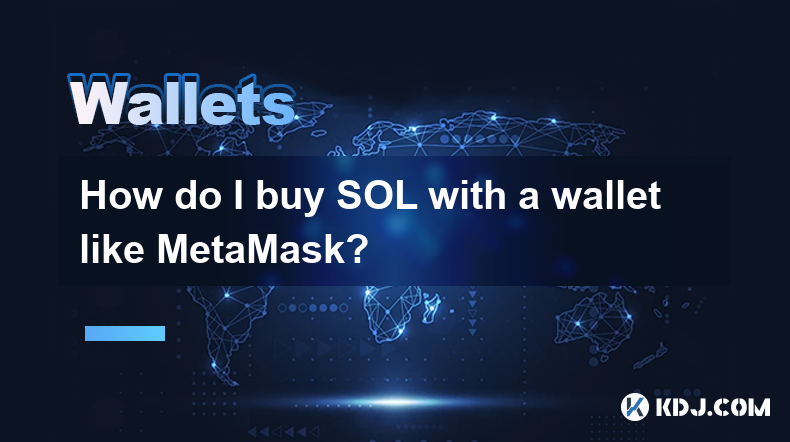
How do I buy SOL with a wallet like MetaMask?
Apr 20,2025 at 01:35pm
How do I Buy SOL with a Wallet Like MetaMask? Purchasing Solana (SOL) using a wallet like MetaMask involves a few steps, as MetaMask primarily supports Ethereum and Ethereum-based tokens. However, with the help of decentralized exchanges (DEXs) and some intermediary steps, you can acquire SOL. This article will guide you through the process in detail. S...
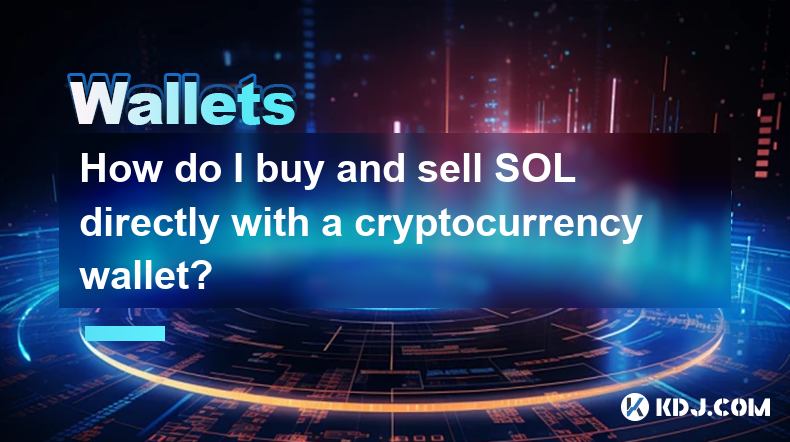
How do I buy and sell SOL directly with a cryptocurrency wallet?
Apr 19,2025 at 05:35pm
Introduction to Buying and Selling SOL with a Cryptocurrency WalletBuying and selling Solana (SOL) directly from a cryptocurrency wallet offers a convenient and secure way to manage your digital assets. Cryptocurrency wallets are essential tools for anyone looking to interact with the Solana blockchain. They allow you to store, send, and receive SOL wit...
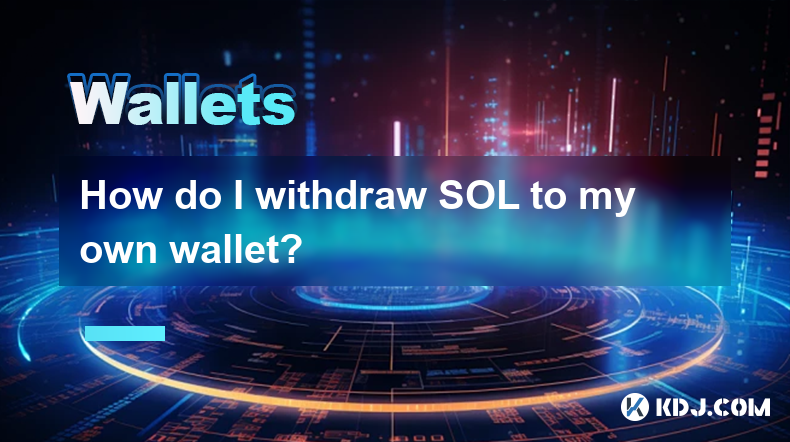
How do I withdraw SOL to my own wallet?
Apr 20,2025 at 04:21pm
Introduction to Withdrawing SOL to Your Own WalletWithdrawing Solana (SOL) to your own wallet is a straightforward process, but it requires careful attention to detail to ensure that your funds are transferred safely and efficiently. SOL is the native cryptocurrency of the Solana blockchain, known for its high throughput and low transaction fees. Whethe...
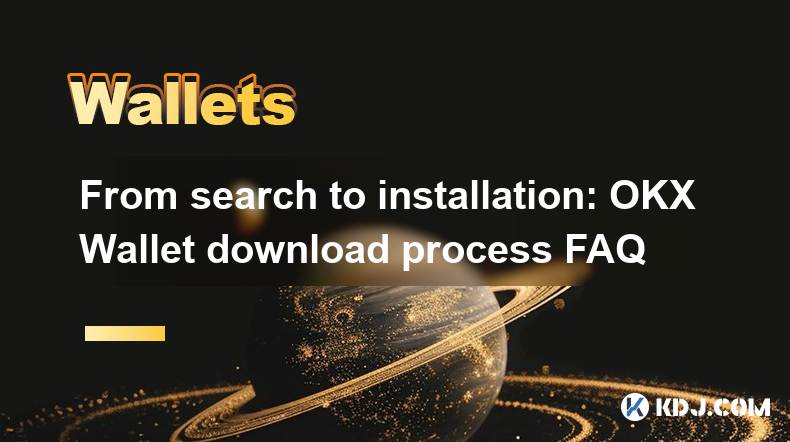
From search to installation: OKX Wallet download process FAQ
Apr 17,2025 at 02:00pm
The OKX Wallet is a popular choice among cryptocurrency enthusiasts for managing their digital assets securely and efficiently. Understanding the process from searching for the wallet to its installation can be crucial for new users. This article will guide you through the entire process, providing detailed steps and answers to frequently asked question...
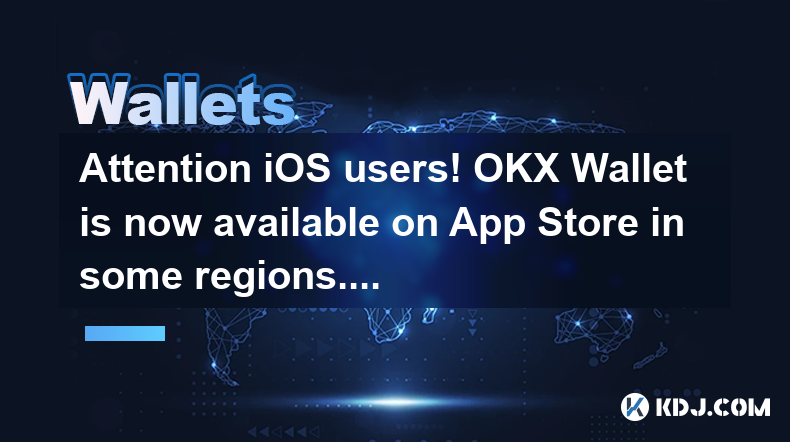
Attention iOS users! OKX Wallet is now available on App Store in some regions. How to check its availability?
Apr 20,2025 at 05:21pm
Attention iOS users! OKX Wallet is now available on App Store in some regions. If you're eager to check its availability and start using this versatile cryptocurrency wallet, follow our detailed guide. We'll walk you through the steps to confirm if OKX Wallet is accessible in your region, and provide insights into its features and benefits. Checking OKX...
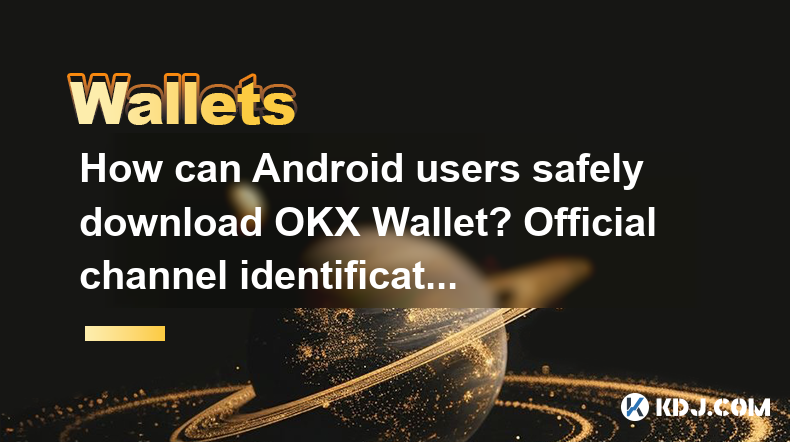
How can Android users safely download OKX Wallet? Official channel identification guide
Apr 19,2025 at 10:50pm
How can Android users safely download OKX Wallet? Official channel identification guide Ensuring the safety and security of your cryptocurrency assets begins with downloading apps from trusted sources. For Android users interested in using OKX Wallet, it's crucial to identify and use the official channels to avoid downloading malicious software. This gu...

How do I buy SOL with a wallet like MetaMask?
Apr 20,2025 at 01:35pm
How do I Buy SOL with a Wallet Like MetaMask? Purchasing Solana (SOL) using a wallet like MetaMask involves a few steps, as MetaMask primarily supports Ethereum and Ethereum-based tokens. However, with the help of decentralized exchanges (DEXs) and some intermediary steps, you can acquire SOL. This article will guide you through the process in detail. S...

How do I buy and sell SOL directly with a cryptocurrency wallet?
Apr 19,2025 at 05:35pm
Introduction to Buying and Selling SOL with a Cryptocurrency WalletBuying and selling Solana (SOL) directly from a cryptocurrency wallet offers a convenient and secure way to manage your digital assets. Cryptocurrency wallets are essential tools for anyone looking to interact with the Solana blockchain. They allow you to store, send, and receive SOL wit...

How do I withdraw SOL to my own wallet?
Apr 20,2025 at 04:21pm
Introduction to Withdrawing SOL to Your Own WalletWithdrawing Solana (SOL) to your own wallet is a straightforward process, but it requires careful attention to detail to ensure that your funds are transferred safely and efficiently. SOL is the native cryptocurrency of the Solana blockchain, known for its high throughput and low transaction fees. Whethe...

From search to installation: OKX Wallet download process FAQ
Apr 17,2025 at 02:00pm
The OKX Wallet is a popular choice among cryptocurrency enthusiasts for managing their digital assets securely and efficiently. Understanding the process from searching for the wallet to its installation can be crucial for new users. This article will guide you through the entire process, providing detailed steps and answers to frequently asked question...

Attention iOS users! OKX Wallet is now available on App Store in some regions. How to check its availability?
Apr 20,2025 at 05:21pm
Attention iOS users! OKX Wallet is now available on App Store in some regions. If you're eager to check its availability and start using this versatile cryptocurrency wallet, follow our detailed guide. We'll walk you through the steps to confirm if OKX Wallet is accessible in your region, and provide insights into its features and benefits. Checking OKX...

How can Android users safely download OKX Wallet? Official channel identification guide
Apr 19,2025 at 10:50pm
How can Android users safely download OKX Wallet? Official channel identification guide Ensuring the safety and security of your cryptocurrency assets begins with downloading apps from trusted sources. For Android users interested in using OKX Wallet, it's crucial to identify and use the official channels to avoid downloading malicious software. This gu...
See all articles























































































